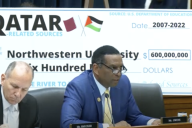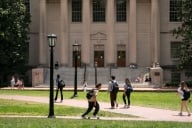You have /5 articles left.
Sign up for a free account or log in.
Advocacy groups pushing for the broad forgiveness of student debt blasted Senator Lamar Alexander’s proposal to excuse borrowers with no income from having to make monthly repayments.
In addition, Alexander, the Tennessee Republican who chairs the Senate education committee, proposed on Tuesday that those making money would only have to make monthly payments equivalent to 10 percent of their income after paying for essentials like housing and food. For either group, any remaining balance would be forgiven after 20 years for those with undergraduate loans and 25 years for graduate loans.
According to the proposal, borrowers could also have the option of paying a fixed annual repayment amount to pay off their loans in no more than 10 years, which could lead to smaller interest payments. The two options, which are not tied to the coronavirus pandemic, would simplify the current “bewildering system,” in which borrowers have to choose from among nine repayment approaches, Alexander said.
Student loan borrowers under the CARES Act have been excused from making payments, interest-free, through Sept. 30. Financial aid experts questioned whether Alexander’s proposals could be put into place before the moratorium ends.
Advocates have sought even broader debt cancellation, including a proposal by Senate Democrats, in which the federal government would make the monthly payments on behalf of borrowers during the pandemic and guarantee all borrowers would have their balances reduced by $10,000.
“Simply put, Senator Alexander's proposal misses the mark on how we need to support student loan borrowers,” said Kyle Southern, higher education director for the millennial advocacy group Young Invincibles. He noted that some who are struggling during the recession would have to start making payments again under Alexander’s proposal.
“While we're seeing record unemployment numbers, we also know many people technically still have employment but have had their hours dramatically reduced. It's not fair to expect them to pick up loan payments, even at a lower rate, just because Congress has decided on a new scheme for how payments should be made,” Southern said.
Southern argued that borrowers already can have their monthly payments limited to 10 percent of their discretionary income.
Mike Pierce, policy director for the Student Borrower Protection Center, also criticized the proposal. “Nearly 40 million student loan borrowers are hurtling towards an economic crisis of this administration’s own making, forced to resume loan payments at the worst possible time,” he said. “Instead of taking the necessary steps to protect borrowers from a looming financial disaster, Senator Alexander is offering platitudes and tired, warmed-over policies that fail to address the magnitude of this crisis.”
However, Carrie Warick, policy and advocacy director for the National College Attainment Network, made up of nonprofits, foundations and some colleges and universities, praised Alexander’s proposal to reduce the numbers of questions applicants have to answer on Free Application for Federal Student Aid forms. The proposal builds on a change made by Congress last year to let the IRS enter information applicants already gave on their tax returns.
The change is even more important during the pandemic, she said. “NCAN members report that providing FAFSA filing assistance to students virtually is even more time consuming and complicated than doing it in person. For this reason, FAFSA simplification is an important part of COVID relief as many seniors will be going to school virtually this fall and unable to meet with their school counselor or college access advisor for support in completing this complicated form,” Warick said in a statement.








